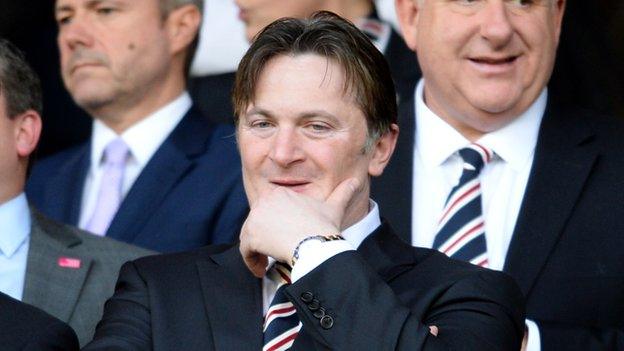Rangers: Mike Ashley makes his move in Ibrox chess game
- Published
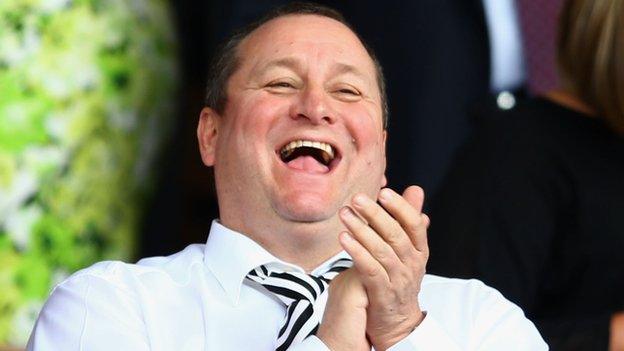
Mike Ashley has a considerable stake in Rangers and control of some of the club's commercial income
Not for the first time, the situation at Rangers is being portrayed as a contest between individuals: who is stronger? Who will prevail?
The reality, as it has always been, is financial: who will fund the club?
Mike Ashley - the Newcastle owner who has a 9% stake in the Ibrox outfit - operates strategically, and his move to call an extraordinary general meeting ahead of the annual meeting, with resolutions to remove Graham Wallace and Philip Nash, is about his own interests.
He has, through Rangers Retail - the company he set up after striking a deal with former Ibrox chief executive Charles Green - control of a significant portion of the club's commercial income.
Before the open offer of shares that raised £3.1m last month, Ashley was prepared to loan the club money, which would have prevented the need for short-term fundraising.
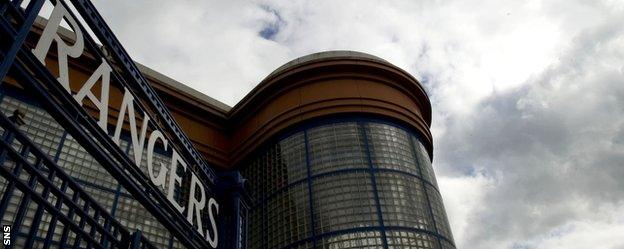
Rangers remain locked in a bitter battle for control
At one stage, late in negotiations, he wanted control of the Rangers trademark. At that point, the board felt other options were preferable to the club's interests.
Ashley then declined to participate in the open offer, but spent more than £800,000 - money which would have gone directly to the club had he taken up his option - buying Hargreave Hale's shares.
This is typical Ashley: blunt, aggressive financial muscle flexing. But does he want a controlling stake in Rangers?
That would be fraught with difficulties, since a prior agreement with the Scottish Football Association limits him to a stake of no more than 10% while he still owns Newcastle.
The Premier League in England has no rules on dual ownership, but the Football League does, which would present a problem should Newcastle be relegated.
Uefa would also not allow Newcastle and Rangers to compete in the same European competition if they are effectively owned by the same person.
There might be mutually beneficial trade-offs to Sports Direct, the company Ashley owns, should he acquire a controlling stake in Rangers.
Certainty, Newcastle fans believe that Ashley's ownership of their club is better for Sports Direct than it is for their team.
Even so, Ashley currently receives the commercial uplift from sales of Rangers merchandise, which leaves the club's board needing to find additional revenue to compensate.
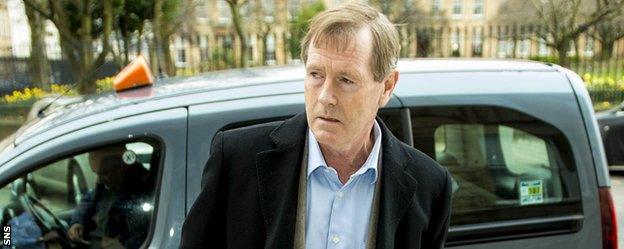
Dave King is keen to invest in Rangers, having previously been a director at Ibrox
There would, then, be little logic to Ashley being the beneficiary of the joint commercial vehicle, Rangers Retail, while also owning the club.
Others do, though, want a controlling stake in Rangers. They are prepared to provide a multi-million pound investment in return.
Dave King, the South African-based former Rangers director, has been adamant for months that he wishes to invest directly in the club, while other like-minded Rangers fans wish to do the same.
Wallace and Nash have been exploring their funding options, since the club is unlikely to be able to meet December's wage obligations without an injection of cash.
Ashley's targeting of the two executives is at the very least a clip on their wings - although there is nothing to stop the board agreeing an investment plan in return for equity before Ashley's EGM.
Removing them, though, might make it more likely that alternative sources of funding are agreed to.
The Newcastle owner needs the backing of 50% of shareholders for his resolutions, a figure he would reach if Sandy Easdale's voting bloc of 26% and Laxey Partners, who own more than 16%, were to join forces. Yet the latter are represented on the board by Norman Crichton, who has appeared supportive of the executives in recent times.
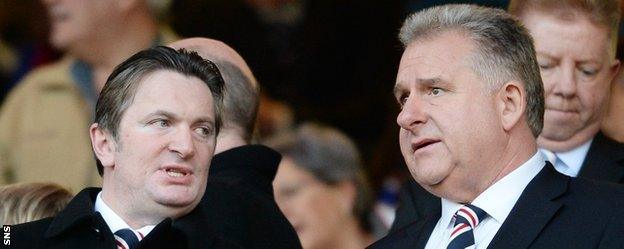
Wallace (right) is under pressure from Ashley and the vote of Easdale (left) could prove crucial at an EGM
Laxey have also stressed that they consider their association with the club to be long term.
Rangers fans will recall that Laxey said they would vote with them ahead of last year's AGM but then changed their mind supported the incumbent board. The reality is that Laxey will do what they consider to be best for their interests.
So what is best for Rangers? All those involved would agree that it is a period of stability and sound finances.
But who provides that? King and other Rangers fans who invest in return for equity? Ashley loaning the club money on his terms? Another option? A combination?
For all concerned, consensus is the best option. For Ashley's commercial deal to thrive, he ultimately needs fans to buy merchandise. The Rangers support is fragmented, but a committed group will agitate against any deal they consider to not be in the club's favour.
Ashley's interests might be best served by a strong, revived club, whose supporters return to buying season tickets in the same numbers as they did before this summer, when 15,000 chose not to renew.
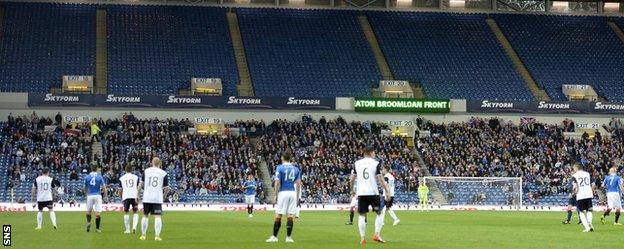
Many Rangers fans decided against renewing their season tickets for this season
Rangers remain a fundamentally damaged institution. Some directors and shareholders may not want King and other fans to buy a controlling stake, since it would end their influence. But to block that means alternative funding would need to be sourced.
Any deal that the board strikes would be subject to shareholder approval, since 75% support is required to approve the issuing of new shares to non-shareholders.
Easdale alone controls 26%, although he only owns 5.21% himself. King and others have been clear about their wish to invest. The board has previously decided that the terms of Ashley's loan offer at that time were not acceptable. Wallace and Nash are caught in the middle, certainly, and events are difficult to predict.
The situation is clear, though. Rangers need money and an ownership regime that the fans will trust in enough numbers to underpin the rebuilding process, and its attendant commercial revenue streams.
By the end of December, there will be an outcome.
- Published8 October 2014
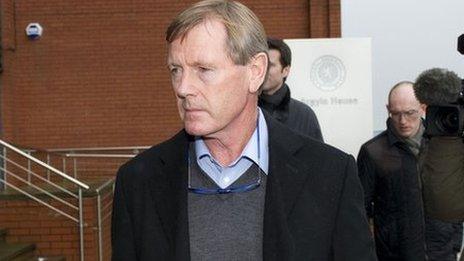
- Published8 October 2014
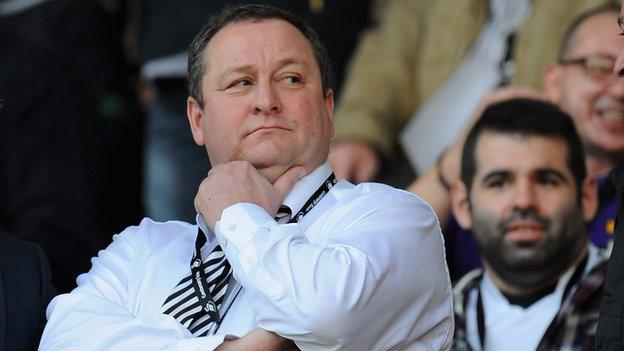
- Published2 October 2014
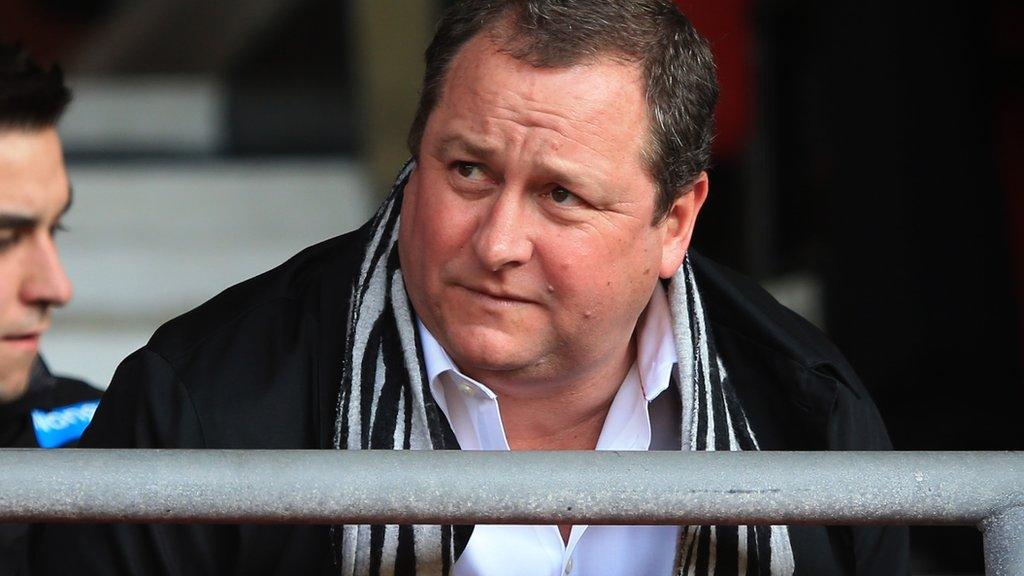
- Published25 September 2014
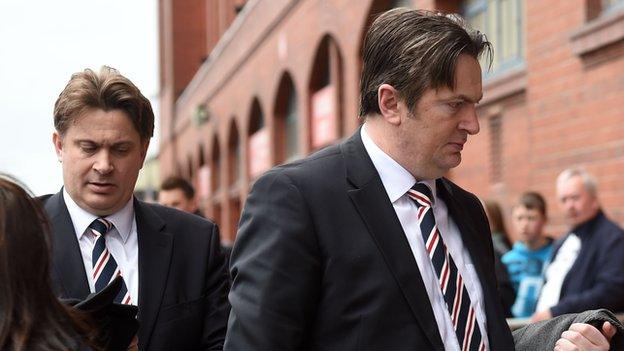
- Published24 September 2014
